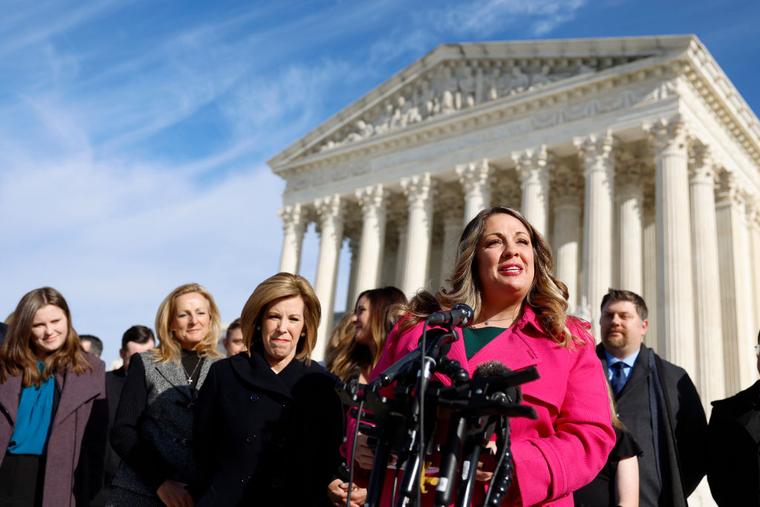When Political Agenda Tries to Override the Constitution
COMMENTARY: ‘Teen Vogue’ magazine’s analysis of Lorie Smith’s case is the latest example.

If your teenage children are curious about how the Constitution and federal laws protect religious believers, then they should steer clear of Teen Vogue.
Surprisingly, the publication has just published a long article on a case before the Supreme Court, involving Lorie Smith, an evangelical Christian website designer in Colorado who doesn’t want to be forced to use her creative talents to design websites for same-sex weddings. Less surprisingly, given Teen Vogue’s progressive worldview, the article is relentlessly biased against her.
Smith is owner of 303 Creative in Colorado and wants to expand her business to create custom wedding websites — but, given her religious convictions, she doesn’t want to promote gay weddings. She asked for a judicial ruling that the First Amendment prohibits enforcement of Colorado’s Anti-Discrimination Act, which would force her to do so. She lost in both the lower court and the 10th Circuit Court of Appeals, but now it looks as if the Supreme Court will reaffirm its longstanding precedent against what it considers to be “government-compelled speech.”
There are arguments on both sides — but Catherine Caruso in Teen Vogue is interested only in those that support the state of Colorado. She parrots for her teen readers (almost verbatim) Mark Joseph Stern in a Slate commentary he wrote after the Court heard oral argument in the case last December: “Colorado law does not compel Smith to create a wedding website for a same-sex couple, or for anyone else. It only insists that once Smith has designed a wedding website, she must allow same-sex couples to purchase that product. In essence, Colorado says she must sell her website template to all customers, regardless of their identity.”
In other words, Caruso claims that the state is not forcing her to sell a particular service or create a particular message that goes against her beliefs. But it obviously is, and it seems as if the Court will recognize that. In which case, proclaims Caruso, it will "deliver a substantial blow to the civil rights and liberties of same-sex couples.” That statement is not just a matter of opinion; it’s highly misleading. The “blow,” if you want to call it that, would come not from the Court but from the Constitution’s guarantee of free speech.
The commentary in Teen Vogue lists decisions in which the Supreme Court “played an important role in a number of major civil rights victories for LGBTQ+ Americans over the years,” such as those that “legalized marriage equality and established workplace nondiscrimination protections for queer and trans people.” But it doesn’t mention that when the Court created a constitutional right to same-sex civil marriage, it also observed that “the First Amendment ensures that religious organizations and persons are given proper protection as they seek to teach the principles that are so fulfilling and so central to their lives and faiths, and to their own deep aspirations to continue the family structure they have long revered.” Nor did the magazine explain that when the Court expanded Title VII — the federal employment anti-discrimination law — to encompass sexual orientation and gender identity, it noted, “We are also deeply concerned with preserving the promise of the free exercise of religion enshrined in our Constitution; that guarantee lies at the heart of our pluralistic society.”
We can expect plenty more of this sort of selective legal analysis in the coming weeks.
Meanwhile, a group of Democrat lawmakers are also using the tactics of misinformation to undermine religious freedom. They are not as they were back in 1993, the year that Democrats joined Republicans in passing the Religious Freedom Restoration Act (RFRA), which protects religious freedom by implementing strict standards for federal laws that interfere with religious practices. RFRA was signed into law by President Bill Clinton.
Today’s Democrats, by contrast, are targeting RFRA, which was the basis of successful challenges to the Affordable Care Act’s contraceptive mandate by Hobby Lobby, the craft-store giant, and the Little Sisters of the Poor. RFRA was incredibly successful in protecting the rights of conscience against the abortion industry and could provide a key defense for employers sued under Title VII. This is why Reps. Robert “Bobby” Scott, D-Va., Jamie Raskin, D-Md., Mary Gay Scanlon, D-Pa., Steve Cohen, D-Tenn., and Sen. Cory Booker, D-N.J., reintroduced the Do No Harm Act, a law to amend RFRA. None other than Vice President Kamala Harris was the primary sponsor of the legislation as a senator.
If the amendment is passed, RFRA could no longer “authorize an exemption from generally applicable law that imposes the religious views, habits, or practices of one party upon another,” meaning it couldn’t be raised as a defense in Title VII lawsuits and could be raised only in cases where the government is a party.
Human Rights Campaign (HRC), a progressive advocacy group, is thrilled by the prospect of dismantling this crucial legislation. “When passed into law more than two decades ago, the Religious Freedom Restoration Act (RFRA) was designed to protect minority religious groups’ constitutional right to freely exercise their religious beliefs,” the group’s website asserts. And then, without missing a progressive beat, it adds:
“Despite this straightforward intent, individuals and businesses have distorted RFRA into a blank check to discriminate or to impose their religious beliefs on others.”
More than 100 progressive organizations, including the ACLU, Americans United for Separation of Church and State, and (of course) Planned Parenthood Federation of America agree with them.
So you can see where we are heading: toward a nervous breakdown by the progressive left if the Supreme Court upholds Lorie Smith's religious freedom. And, knowing teenagers, we can be assured that some of the most hysterical reactions will come from the brainwashed readers of Teen Vogue. It's a depressing prospect, but it's better than the alternative: government control of ordinary citizen's websites. The people of China and other undemocratic societies already live in that dystopia. At the moment, the Supreme Court is protecting us from that fate. But for how long?















